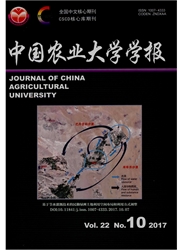

 中文摘要:
中文摘要:
农田覆膜技术应用广泛,覆膜条件下农田蒸散发(ET)规律是制定合理灌溉制度、提高用水效率的基础。根据2014—2015年甘肃省石羊河流域春小麦试验观测资料率定和验证农田水量平衡模型,利用双作物系数法得到作物的耗水规律和耗水结构。结果表明,覆膜春小麦全生育期耗水比不覆膜减少10%~16%,有一定的节水效果。覆膜促进了春小麦全生育期蒸腾,蒸腾占总耗水的比例在70%~74%之间,比不覆膜情况提高了25%~27%。在春小麦生长前期,覆膜能够显著降低ET;中期,覆膜能够降低土壤蒸发、促进作物蒸腾。此外,覆膜还具有促进作物前期生长、延长作物中期生长、延缓冠层衰老的作用。
 英文摘要:
英文摘要:
Plastic mulch has been widely used in agricultural production, especially in arid and semiarid regions. The study of crop evapotranspiration and crop coefficient in fields with plastic mulch is the base for irrigation scheduling and improving water use efficiency, especially in Northwest China where water shortage happens frequently. Based on field experiment data of spring wheat in 2014-2015 in the Shiyang River Basin Experiment station in Gansu province, water balance components over the spring wheat field was analyzed using the dual crop coefficient approach for crop evapotranspiration and a field water balance model through calibration and verification. The pattern and structure of water consumption under different irrigation treatment with and without mulch was revealed by simulating the variation of soil water content in the whole growing stage of spring wheat. The results showed that evapotranspiration of spring field with mulch was reduced by 10% to 16% for different irrigation treatment compared with field without mulch, which indicated the effect of water saving for plastic mulch. The plastic mulch attained the optimal effect of saving water at the initial stage and reduced the water consumption by 69.03% in the stage compared to no mulch. At the development stage, the water consumption and its rate was similar for spring wheat with or without mulch. After stepping into mid stage, plastic mulch achieved a similar evapotranspiration rate due to the higher crop transpiration. According to the analysis for water supply and consumption, the water scarcity period was at the mid or late stage for spring wheat with mulch and initial or development stage for spring wheat without mulch. Hence irrigating late properly could be advantage for plastic mulch. In the study, the calibrated basal crop coefficients for initial, mid and late stage were separately 0.101, 0.751 and 0.300 for spring wheat without mulch and 0.150, 0.900 and 0.700 for spring wheat with mulch. The basal crop coefficient in mid stage was relativ
 同期刊论文项目
同期刊论文项目
 同项目期刊论文
同项目期刊论文
 期刊信息
期刊信息
